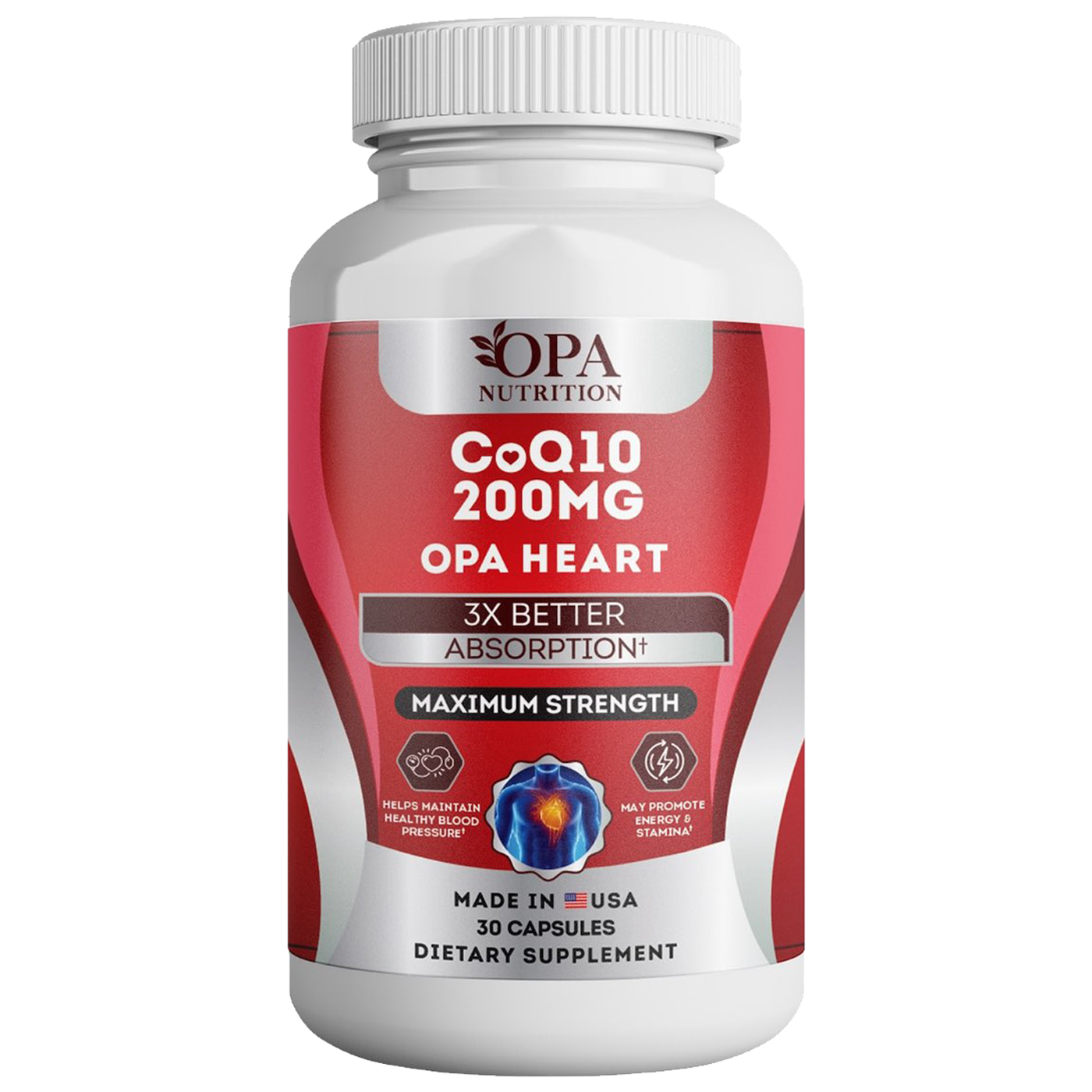Embarking on a journey through the cellular world, we uncover the mysteries and manifestations of primary coenzyme Q10 deficiency (CoQ10) and its essential roles in our bodies. It’s pivotal to understand and address CoQ10 deficiency as it can be a hidden culprit behind several health issues. In this exploration, a vital question arises: What are the symptoms of low CoQ10? Recognizing these symptoms is crucial for timely intervention and management. Let’s delve deeper into this cellular component’s significance, how to detect its deficiency, and explore the multitude of methods available to keep it in check.

OPA Heart
The #1 CoQ10 for Heart Health
Heterogeneity of CoQ10 Deficiency

Coenzyme Q10 is as complex as it is crucial, playing a pivotal role in our bodies’ cellular processes and overall health. The enigma of CoQ10 deficiency is marked by its heterogeneity – its varied manifestations across individuals, implying a spectrum of symptoms and severities.
At its core, CoQ10 is a vital participant in the symphony of cellular energy production. Its deficiency can throw our body’s harmonious melody into discord, resulting in a myriad of health issues. The varied manifestations of CoQ10 deficiency range from mild disturbances in daily vitality to severe disruptions in metabolic functionalities, making it a formidable foe to our well-being.
Furthermore, the heterogeneity of CoQ10 deficiency is intricately linked with genetics. The inheritance patterns associated with this deficiency contribute to its complexity, playing a decisive role in the likelihood of an individual developing this condition. It is like a genetic puzzle, where every piece contributes to the overall picture of CoQ10 levels in the body. Mutations in any of these pieces can distort the image, leading to a deficiency.
Unraveling this complex tapestry requires a deeper understanding of the biochemical pathways involved in CoQ10 synthesis and utilization. It’s a dance of molecules, where any misstep can lead to a cascade of cellular disruptions. The body’s ability to produce and use CoQ10 efficiently is paramount in maintaining energy balance and preventing the onset of associated health issues.
Delving deeper, we find that the impact of CoQ10 deficiency is not just limited to energy metabolism. It extends its shadow to the cellular defense mechanisms. CoQ10 acts as an antioxidant, guarding the cells against the damaging effects of oxidative stress. When this guardian is in short supply, the cellular citadel becomes vulnerable, opening the gates to a plethora of health problems.
In the vast landscape of CoQ10 deficiency, the neurological manifestations hold a significant place. The brain, being an energy-demanding organ, is particularly susceptible to fluctuations in CoQ10 levels. Deficiency in this vital compound can lead to a spectrum of neurological symptoms, affecting cognitive functions and motor coordination. The intricacies of these manifestations are still being unraveled, adding another layer to the complexity of CoQ10 deficiency.
Understanding the Inheritance Patterns
Inheritance patterns of CoQ10 deficiency are akin to a labyrinth, with genetics holding the key to navigating through the maze. The intricate dance of genes involved in CoQ10 synthesis and utilization forms the foundation of these patterns. Any variations in this genetic choreography can result in a spectrum of manifestations associated with CoQ10 deficiency.
Multiple genes contribute to the symphony of CoQ10 synthesis, each playing a unique role in the composition. Mutations in any of these genes can disrupt the melody, leading to deficiency. Understanding the inheritance patterns of these genetic variations is crucial in decoding the mysteries of CoQ10 deficiency and developing personalized approaches to manage and mitigate its impacts.
It’s not just about the genes that are directly involved in CoQ10 synthesis; the supporting cast of molecules also plays a vital role. These molecules, involved in the transportation and utilization of CoQ10, contribute to the overall efficiency of the cellular energy production process. Variations in these supporting genes can also lead to disruptions in CoQ10 levels, adding another dimension to the inheritance patterns of deficiency.
This intricate web of genetics paints a picture of individual susceptibility to CoQ10 deficiency. It’s about understanding the unique genetic makeup of an individual and how it influences the synthesis, transportation, and utilization of CoQ10. By decoding these genetic blueprints, healthcare professionals can develop tailored strategies to address the specific needs of individuals, optimizing their CoQ10 levels and mitigating the risks associated with deficiency.
The journey through the genetic labyrinth of CoQ10 deficiency is ongoing. Researchers and healthcare professionals continue to explore the intricacies of inheritance patterns, striving to develop more effective and personalized approaches to manage this complex condition. It’s a journey of discovery, where every step brings us closer to unlocking the potential of personalized medicine in addressing CoQ10 deficiency.
Manifestations and Symptoms
The manifestations of CoQ10 deficiency are as diverse as the colors of a rainbow, each symptom painting a unique picture of the condition. From fatigue and a progressive muscle stiffness and weakness to serious neurological disturbances, the array of symptoms associated with this deficiency is vast.
Fatigue is one of the most common companions of CoQ10 deficiency. It’s like a shadow, subtly affecting an individual’s daily vitality and quality of life. The body’s energy production is compromised, leading to a pervasive sense of tiredness and lack of energy. This fatigue can affect both physical and mental aspects, making daily tasks feel like climbing mountains.
Muscle weakness is another hallmark of CoQ10 deficiency. The muscles, being heavily reliant on energy production, are particularly vulnerable to fluctuations in CoQ10 levels. Weakness in the muscles can manifest as difficulty in performing physical activities, leading to a decline in overall mobility and independence.
On the more severe end of the spectrum, CoQ10 deficiency can lead severe brain dysfunction and to neurological symptoms. The brain, with its high energy demand, is susceptible to disruptions in CoQ10 levels. Cognitive functions such as memory, attention, and problem-solving can be affected, leading to challenges in daily life. Motor coordination can also be compromised, affecting an individual’s ability to move smoothly and efficiently.
The recognition of these symptoms is the first step in managing CoQ10 deficiency. Early detection and intervention are key to preventing the progression of the condition and optimizing overall health. By being vigilant about the diverse manifestations of CoQ10 deficiency and seeking timely medical advice, individuals can navigate through the challenges associated with this condition and embrace a healthier, more vibrant life.
How To Prevent CoQ10 Deficiency – CoQ10 Recommended Dosages

Preventing CoQ10 deficiency is akin to maintaining a delicate balance. This balance is pivotal in ensuring that the symphony of cellular function plays its harmonious tune, contributing to our overall well-being. With the variation in individual needs, age, and health conditions, recommended dosages of CoQ10 aren’t a one-size-fits-all solution. Striking the right balance through meticulous considerations and personalized approaches ensures optimal cellular function and fortification against deficiency.
Navigating through the maze of CoQ10 levels involves exploring various avenues – from dietary adjustments to supplementation. The diversity in these pathways provides a rich tapestry of options, allowing individuals to tailor their approach to preventing deficiency. By integrating these strategies with lifestyle adjustments and medical advice, one can build a robust defense against the impacts of low CoQ10 levels.
Dietary sources of CoQ10 are abundant, offering a delicious array of options for those looking to boost their levels naturally. The incorporation of CoQ10-rich foods, such as organ meats, fatty fish, and whole grains, paints a culinary canvas, allowing individuals to explore the flavors of health. By intertwining these dietary adjustments with a balanced lifestyle, one can embrace the vibrancy of well-being, fortified against the shadows of deficiency.
In addition to natural sources, supplementation offers a targeted approach to preventing CoQ10 deficiency. The landscape of CoQ10 supplements is vast, providing a spectrum of options tailored to individual needs. From different formulations to varying dosages, the world of supplementation is a treasure trove of possibilities. Consulting healthcare professionals, understanding individual requirements, and finding the right balance are keys to unlocking the benefits of CoQ10 supplementation.
Natural Ways to Boost CoQ10 Intake
Nature, in its boundless generosity, provides a treasure trove of CoQ10 sources. The greens of spinach, the crunch of broccoli, and the richness of fatty fish are but a few examples of the culinary delights that are rich in this vital compound. Incorporating these nutrient-dense foods into our daily diet is not just a journey through flavors but a delightful way to enhance CoQ10 levels naturally.
Exploring the diversity of CoQ10-rich foods unveils a culinary adventure. From the seas, we get fatty fish like salmon and mackerel, which are not only delicious but also brimming with CoQ10. From the land, we have meats, particularly organ meats like heart and liver, which are treasure chests of this vital compound. And from the gardens, a variety of vegetables and legumes wave their green flags, contributing to the symphony of natural CoQ10 sources.
Beyond these, seeds and nuts are the unsung heroes in this nutritional symphony. They may be small, but they are mighty in CoQ10 content. Sprinkling them on salads, incorporating them in meals, or simply enjoying them as snacks can significantly contribute to CoQ10 levels.
The joy of discovering and integrating these natural sources of CoQ10 into one’s diet is complemented by the myriad of health benefits they offer. It’s a harmonious blend of taste and nutrition, a dance of flavors that fortifies the body’s cellular defenses, and a culinary journey that paints a canvas of well-being.
Finding the Right CoQ10 Dosage
Determining the ideal CoQ10 dosage is a journey through the intricacies of individual health needs, lifestyle considerations, and potential interactions with medications. It’s a balancing act, where the scales of benefit and risk are carefully weighed, and the dosage is tailored to the unique requirements of each individual.
Embarking on this journey requires a compass – guidance from healthcare professionals who understand the landscape of CoQ10 supplementation. Through consultations and evaluations, a personalized map is drawn, highlighting the routes to optimal CoQ10 levels and the potential pitfalls to avoid.
The terrain of CoQ10 dosage is diverse, with varying recommendations based on age, health conditions, and individual needs. Navigating through this terrain requires vigilance and adaptability, adjusting the dosage as the journey progresses and new insights are gained.
In this exploration, the importance of monitoring and adjustment cannot be overstated. Regular check-ups, blood tests, and open communication with healthcare providers ensure that the journey is on the right track, and the destination of optimal CoQ10 levels is within reach.
CoQ10 Deficiency Causes – What Can Cause Low CoQ10?

Unveiling the mysteries behind CoQ10 deficiency involves identifying the myriad of factors that can contribute to diminished CoQ10 levels. It’s a detective’s journey, where clues are pieced together, and the culprits behind the deficiency are brought to light. Medication interactions, underlying health conditions, and lifestyle choices are all potential suspects in this investigation, and understanding their roles is crucial for developing personalized strategies to address and overcome deficiency.
The journey to understanding the causes of CoQ10 deficiency is marked by exploration and discovery. It’s about delving into the intricacies of cellular metabolism, uncovering the interactions between medications and CoQ10 levels, and unraveling the links between health conditions and deficiency. Every discovery sheds light on the shadowy corners of CoQ10 deficiency, providing insights and guiding the development of personalized intervention strategies.
In this exploration, the role of medications is a focal point. Certain drugs, while alleviating one ailment, can act as double-edged swords, depleting CoQ10 levels and contributing to deficiency. Being aware of these interactions, discussing alternatives or supplements with healthcare providers, and monitoring CoQ10 levels are essential steps in mitigating the risk of deficiency.
Drugs that May Deplete CoQ10 Levels
The landscape of medications is vast and varied, and within this landscape, certain drugs can act as double-edged swords. While they alleviate the symptoms of one ailment, they can also deplete CoQ10 levels, contributing to deficiency. It’s a delicate balance, where the benefits of medication are weighed against the potential risks, and alternatives or supplements are considered to mitigate the impact on CoQ10 levels.
Among the medications that can deplete CoQ10 levels are statins, used to lower cholesterol levels. While they play a crucial role in managing cardiovascular health, their impact on CoQ10 levels is a consideration that cannot be overlooked. Discussing this interaction with healthcare providers, exploring alternatives, and considering supplementation are essential steps in managing this balance.
Beta-blockers, used to manage high blood pressure and heart conditions, are also on the list of medications that can affect CoQ10 levels. The balancing act with these medications involves careful monitoring, adjustments in dosage, and consideration of CoQ10 supplementation to ensure that the heart’s rhythm continues to play its harmonious tune.
Antidiabetic drugs, which manage blood sugar levels in diabetic patients, can also impact CoQ10 levels. The dance of balancing blood sugar levels and maintaining optimal CoQ10 levels is a delicate one, requiring vigilance, regular monitoring, and open communication with healthcare providers.
In the vast field of medications, knowledge is power. Being aware of the potential interactions between drugs and CoQ10 levels, discussing these with healthcare providers, and considering alternatives or supplementation are essential steps in mitigating the risk of deficiency.
Health Issues Linked to CoQ10 Deficiency
The spectrum of health issues associated with CoQ10 deficiency is as diverse as the colors of a rainbow. Each health condition paints a unique picture of the impacts of low CoQ10 levels, contributing to the vast tapestry of manifestations associated with deficiency.
Cardiovascular conditions hold a significant place in this tapestry. The heart, with its relentless rhythm and energy demand, is particularly susceptible to fluctuations in CoQ10 levels. Conditions such as heart failure, hypertension, and atherosclerosis are intricately linked to CoQ10 deficiency, and managing these conditions involves addressing the underlying deficiency.
Neurological disorders are also woven into the fabric of CoQ10 deficiency manifestations. The brain, an energy-hungry organ, is vulnerable to disruptions in CoQ10 levels. Conditions such neurological abnormalities such as Parkinson’s disease, migraines, and seizures are associated with low CoQ10 levels, and addressing the deficiency is a pivotal step in managing these disorders.
Beyond the cardiovascular and neurological realms, CoQ10 deficiency also casts its shadow on muscular and metabolic health. Muscle weakness, exercise intolerance, and fatigue are manifestations of low CoQ10 levels, affecting daily vitality and quality of life. Addressing the deficiency, optimizing CoQ10 levels, and managing the associated symptoms are essential steps in combating these impacts.
Unveiling the links between health issues and CoQ10 deficiency is an ongoing journey of discovery. Researchers continue to explore the intricacies of these links, striving to develop more effective and personalized approaches to manage the associated conditions. It’s a journey of hope, where every step brings us closer to a deeper understanding of CoQ10 deficiency and its manifestations.
This comprehensive exploration through the various causes and manifestations of CoQ10 deficiency paints a multifaceted picture of the condition. It’s a tapestry woven with threads of knowledge, insights, and discoveries, contributing to a deeper understanding of the deficiency and guiding the development of personalized intervention strategies.
What is Coenzyme Q10 Main Roles in Your Body and How to Fight Premature Aging?

Coenzyme Q10, often likened to a cellular powerhouse, is a beacon of energy and protection within our bodies. Its role is multifaceted, participating in crucial metabolic processes, and acting as a formidable shield against oxidative stress. This compound is not just about cellular vigor; its significance permeates through the entire body, marking its territory in the realms of overall health, vitality, and longevity. By maintaining optimal CoQ10 levels, we are not just fueling our cellular engines but also armoring ourselves against the visible and internal signs of premature aging.
Understanding the nuances of CoQ10’s functions and its impact on aging is akin to peeling layers of an onion. Each layer reveals a new dimension of its role, adding depth to our comprehension of how this molecule is a cornerstone for youthful vigor and vitality.
CoQ10's Role in Cellular Energy Production
Diving into the cellular world, one can witness a bustling city of metabolic activities, with CoQ10 playing the role of a central powerhouse. Positioned within the mitochondria, the energy-producing factories of our cells, CoQ10 is a linchpin in the synthesis of ATP (adenosine triphosphate) – the universal energy currency that powers life’s myriad activities.
By facilitating the conversion of nutrients into usable energy, CoQ10 is not merely an energy provider; it’s a sustainer of life, ensuring every cellular function, from muscle contraction to nutrient metabolism, operates seamlessly and efficiently. The ripple effect of this energy production is felt throughout the body, contributing to our overall vitality, stamina, and well-being.
Moreover, the significance of CoQ10 in energy production is especially prominent in organs with high energy demands, such as the heart and brain, making it a vital component in supporting their optimal function.
Protecting Cells from Oxidative Stress
In the battle against cellular damage, CoQ10 emerges as a valiant protector, standing guard against the onslaught of oxidative stress. This form of stress, resulting from an imbalance between free radicals and antioxidants, is a precursor to cellular damage and aging.
CoQ10, with its antioxidant prowess, neutralizes harmful free radicals, preventing them from causing damage to cellular structures, proteins, and DNA. By preserving cellular integrity and function, CoQ10 is instrumental in supporting overall health and wellness, and its protective role is particularly vital in combating age-related degenerative diseases.
Additionally, the antioxidant role of CoQ10 is not just about defense; it’s about rejuvenation. By mitigating oxidative damage, CoQ10 contributes to the repair and regeneration of cells, promoting skin health, and fighting the visible signs of aging.
Coenzyme Q10 For Heart Failure and Other Heart Conditions

The heart, with its rhythmic and unceasing beats, shares a symbiotic relationship with CoQ10. This essential molecule is a pillar of cardiovascular health, playing a crucial role in fueling the heart's energy demands and acting as a protective shield against oxidative damage. The significance of CoQ10 in cardiac health has led to its exploration as a supplemental treatment, offering hope and complementary therapeutic potential for those grappling with heart failure and other cardiac conditions.
In the complex tapestry of cardiovascular health, CoQ10 threads its benefits through various aspects, from energy production to antioxidative protection, making it a subject of extensive research and growing interest in the management of heart conditions.
CoQ10 as a Supplemental Treatment
In the world of cardiovascular health, the spotlight on CoQ10 has intensified, revealing its potential as a supplemental treatment for heart conditions. Research indicates that CoQ10 supplementation can enhance cardiac function, particularly in individuals with heart failure, by improving energy production and reducing oxidative damage.
The utilization of CoQ10 as a supplemental treatment goes hand in hand with conventional therapies, offering a complementary approach to enhance treatment outcomes. It’s a dance of synergy, where CoQ10 moves in tandem with standard treatments, contributing to improved cardiac function, reduced symptoms, and enhanced quality of life for individuals with heart failure.
Clinical trials and studies have illuminated the potential of CoQ10 supplementation in reducing hospitalization rates for heart failure patients and improving exercise capacity, showcasing its role as a valuable adjunct in heart failure management.
Potential Benefits Beyond Heart Failure
The narrative of CoQ10’s benefits does not end with the heart disease or failure; it extends across the vast landscape of cardiovascular health. Emerging research suggests that CoQ10 can play a supportive role in managing conditions such as hypertension by aiding in the relaxation of blood vessels and improving endothelial function.
Furthermore, CoQ10’s antioxidative properties contribute to the protection of blood vessels from damage, reducing the risk of atherosclerosis, a precursor to various cardiovascular diseases. By fostering a healthy environment within the vascular system, CoQ10 is laying the foundation for a heart-healthy life.
Additionally, preliminary studies hint at the potential of CoQ10 in supporting healthy cholesterol levels by improving the ratio of HDL (good) to LDL (bad) cholesterol, adding another dimension to its cardiovascular benefits.
Summary
As we conclude our exploration of coenzyme Q10 and its deficiency, it’s evident that this cellular component is integral to our well-being. From understanding its diverse manifestations to delving into prevention and treatment strategies, we have unraveled the mysteries of coenzyme Q10 deficiency. By embracing knowledge and adopting a proactive approach, we can ensure that our cellular symphony continues to play harmoniously.
Frequently Asked Questions
Symptoms of low CoQ10 can be diverse and include fatigue, muscle weakness, and cognitive disturbances. In more severe cases, individuals might experience seizures, neurological symptoms, and irregular heartbeat. Monitoring these signs and consulting healthcare professionals for appropriate measures can ensure optimal health.
Deficiency in CoQ10 can result from various factors, including genetic mutations affecting CoQ10 synthesis, age-related decline, nutritional deficiencies, and the use of certain medications that deplete CoQ10 levels. Being vigilant about these factors and adopting preventive strategies can mitigate the risk of deficiency.
Primary CoQ10 deficiency is typically treated with CoQ10 supplementation. The dosage is personalized based on individual needs, health conditions, and the severity of the deficiency. Lifestyle and dietary adjustments, along with regular monitoring and consultation with healthcare providers, contribute to effective management of the condition.
Foods rich in CoQ10 include organ meats such as liver and kidney, fatty fish like salmon and mackerel, and whole grains. Additionally, spinach, broccoli, and peanuts are also good sources. Incorporating a variety of these foods into the diet can help maintain optimal CoQ10 levels.



